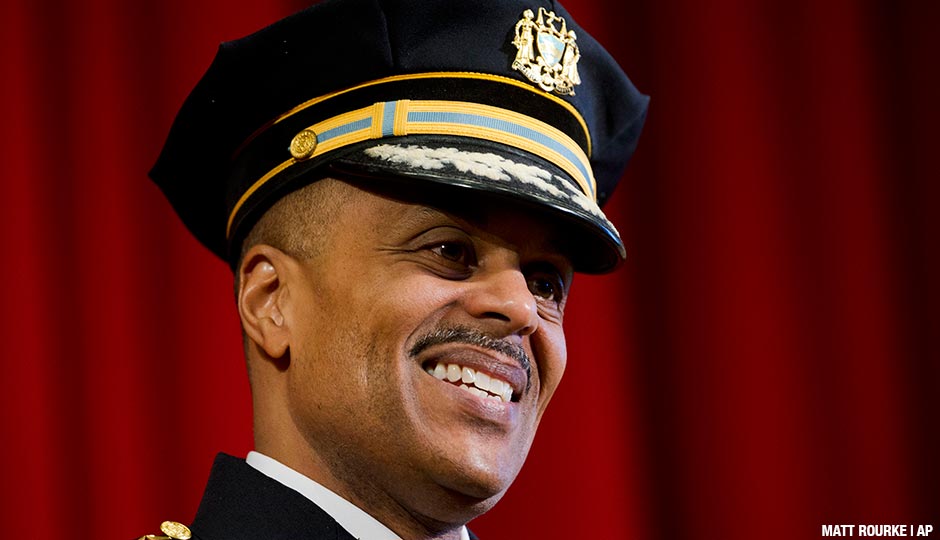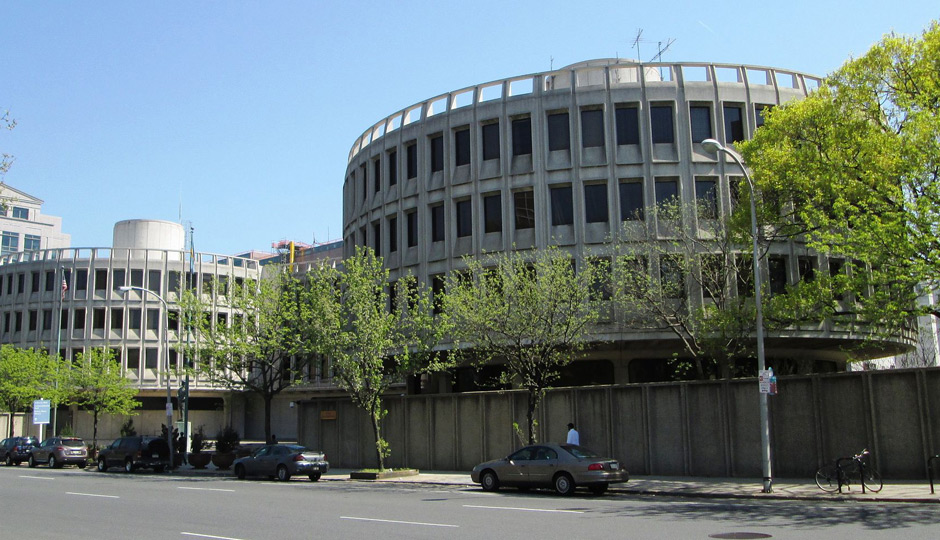The Quiet Commissioner: Inside Richard Ross’s First Year as Top Cop

Richard Ross waited a decade for the chance to get into this chair.
It’s a smooth, ergonomic number with a high back — a captain’s chair, positioned at the head of a long conference table inside a heavily wood-accented office on the third floor of police headquarters. He looks comfortable sitting there, the well-practiced understudy who’s finally gotten his crack at the lead role.
Ever since 2005, when then-Police Commissioner Sylvester Johnson promoted a 40-something Ross from Homicide Unit captain to deputy commissioner, the consensus within the department’s many gossipy cliques was that he would end up with the top job sooner or later. He was a straight shooter, police insiders would say, a decent man who was smart as hell to boot.
So it came as little surprise when newly elected Mayor Jim Kenney selected Ross last fall to be his commissioner. Chuck Ramsey had already announced he would retire at the end of his eight-year run, and the Fraternal Order of Police Lodge No. 5 — which supported Kenney in the crowded Democratic mayoral primary race — let it be known that it wasn’t in favor of another outsider being brought in to run the department.
So Ross finally had his dream job. But the circumstances, well, they were another story.
When Michael Nutter lured Ramsey to Philadelphia in 2007, he gave Ramsey a singular task: drive down the unsightly violent crime numbers so that people (especially tourists) talked about the city’s abundance of restaurants and museums instead of clutching their pearls at the real and imagined horrors of “Killadelphia.”
Ross, however, was handed the reins at one of the most complicated and volatile turning points in the history of law enforcement in America. Being a successful police chief in the post-Ferguson age requires one to dance in between rain drops, to be principled but flexible, open-minded but firm. He would need to keep the crime figures low, but not by relying on heavy-handed approaches. Rebuild frayed relations with minority communities who feel fed up with abusive policing tactics, but without making his rank-and-file cops feel like he didn’t have their backs. Support more progressive and transparent policies, but without sacrificing the fundamentals of police work.
I sat down with Ross earlier this week to discuss his first year as commissioner, to figure out where he sees himself in that complicated landscape. Plenty of other people have wondered the same thing about the new top cop, who isn’t as adept at soundbites as some of his predecessors. But he had been offering hints throughout the year in the way he responded to challenges, whether big — like the Super Bowl of Stress that was the Democratic National Convention — or small, like an old North Philly church filled with angry residents and activists.

“Philadelphia Police Headquarters” by Beyond My Ken – Own work. Licensed under CC BY-SA 3.0 via Wikimedia Commons.
ROSS WAS SWORN IN on January 5th, a clear and chilly Tuesday in Philadelphia. His first test came two days later — and with an international incident, no less. A patrol cop named Jesse Hartnett was nearly executed while driving his cruiser on 60th Street near Spruce in West Philly late that night. A large, bearded man ran up to Hartnett’s patrol car and opened fire at point-blank range, squeezing the trigger of his 9mm Glock until it was empty.
Watch the videotape and you’ll have to believe in miracles: Hartnett was hit three times in the arm, but he survived. The shooter, Edward Archer, was dressed in long, flowing Muslim garb, and told detectives that he’d pledged allegiance to ISIS, and shot Hartnett in the name of Allah.
The incident inflamed tensions on a couple of levels: The ambush-style nature of the attack reinforced a feeling among cops that they’re all targets in an age of vitriol surrounding police shootings across the country, and Archer’s ISIS declaration was fodder for politicians and talking heads who used the opportunity for saber-rattling.
Ross matter-of-factly discussed Archer’s stated motivation for the ambush at a news conference, which won over a number of cops who felt like Kenney had been too politically correct when he argued that the shooting had nothing to do with Islam. You understood the point Kenney was making — the actions of one crackpot shouldn’t indict a whole religion — but in the wake of seeing one of their own attacked, some cops interpreted the line differently. They just wanted someone at the podium to tell it like it was, and Ross didn’t disappoint.
That same incident offered additional insight into Ross’s approach as police commissioner. I spent some time in the 60th Street area in the days following the attempted murder of Hartnett; the entire corridor, once a thriving commercial strip, had been plagued by gun violence for years, and it had been growing worse in recent months. Mothers told familiar stories of being afraid to let their sons leave the house, even to go to school.
I thought this would prove to be a flag-planting moment where the department would vow to crack down on guns and violent crime in the area and flood the streets with special units. Foot patrols increased in the neighborhood, but that was about it. I was a bit surprised, and had the same reaction in the spring when the number of murders and shootings started to spike, and there was no announcement about plans to address the typically busy summer months.
Ross’s most recent predecessors — Ramsey, Johnson, John Timoney — had all rolled out overtime-heavy manpower surges that they called Operation [Resolute Name Here] whenever the numbers turned ugly. It was also each man’s way of showing that he was putting his own stamp on the department’s crime-fighting strategies. But Ross isn’t interested in playing to the cameras to make it seem like he’s discovered a new formula.
“You would know probably better than some of your colleagues that [when I was] first deputy here,” Ross tells me, “Chuck Ramsey kind of involved me significantly in the day-to-day operations, so much so that a lot of the crime plans were either mine, or mine and [former deputy commissioner Kevin] Bethel’s, or someone else’s.
“For me now to assume this position and say I have to make everything look different than before so that people will think this is who Rich Ross is, I don’t have that kind of ego where I worry about things like that. I do understand why people sometimes are concerned with new versus whatever, but I think internally people pick up on little nuances.”
As of Wednesday night, the city has recorded 266 murders this year, compared to 260 at this point a year ago; it seems likely that the tally will stay well under 300 for the fourth year in a row. The number of shooting victims stands at 1,240, up from 1,157 last year. Overall violent crime is down 5 percent. What’s usually left unsaid whenever crime numbers are bandied about is that the city is still plagued by crushing poverty, a hobbled education system, and not enough middle-class jobs — and as long as those things are true, violent crime will only fall so far.
But the crime numbers don’t measure how average cops feel about the new boss. There’s a comfort level there, for sure, having a local guy at the top again. But some longtime officers are still trying to figure out where Ross will lead them. “Nothing’s changed that much. I think he’s done pretty much everything Ramsey did, in lockstep,” says one longtime commander. “I don’t think he’s made it his own yet, or blazed his own path. But he’s not a bad leader by any stretch of the imagination. But I also don’t think he’s really been tested yet, in relationship to a lot of [police controversies] you see happening around the country.”
Another commander adds that “a lot of people feel as though he hasn’t put a mission out regarding what he wants out of his time as police commissioner.” To this, Ross notes that he sees his tenure “as a kind of passing the baton.” Ramsey made significant strides in pushing the department into the 21st century — technologically, strategically, ethically — so Ross isn’t treating the job like a teardown project. And like Jim Kenney, Ross is reluctant to step into the spotlight unless it’s absolutely necessary.
His most noticeable moves have been removing perpetually lit blue and red lights from the tops of patrol cars — a tweak Ross says rank-and-file cops called for — and doing away with a 60-college credit requirement for new hires. The latter was aimed at boosting the number of recruits at the police academy, and Ross says the average number of applicants has already jumped from about 1,200 people to 5,000 since the college requirement was removed.
I wondered what Kenney makes of his top cop; they didn’t have the same public courtship that Nutter and Ramsey did. (Ross says the two men have had a working relationship for years.) “Commissioner Ross has done an incredible job during an incredibly difficult time for policing,” the mayor responded in a statement. “When he entered the academy, all officers were expected to do was keep crime down. When I selected him as my Commissioner, I asked him to keep crime down but not to over police, to keep order during the DNC but also to respect free speech, and to navigate a number of other very narrow lines along the way.
“Commissioner Ross took on all these challenges without complaint and with an impressive, selfless determination to better the city he’s always called home. And, furthermore, he succeeded: he kept crime down, avoided the crises that have plagued several major cities, and strengthened the culture of accountability within the Department. I feel incredibly privileged that he is serving in Philadelphia.”
Ross says Kenney has largely left him to run the department as he sees fit: “I don’t struggle with his expectations. I more so struggle with the fact that we’re just in a different time, and realizing for policing that it’s going to be inherently challenging now, because people want to feel safe, they want crime to be reduced, but on the same token, people want reform, and they want less policing. And they’re not mutually exclusive.”

A protest march in Center City on July 24th, 2016. (AP/John Minchillo)
THERE ARE DIFFERENT TYPES of pressure cookers — big ones that threaten to go off like a mushroom cloud, and smaller ones that are harder to spot but just as intense. Ross dealt with both this year.
The big one, of course, was the DNC. The 2000 Republican National Convention, one of modern Philadelphia’s first forays into trying to convince people it could handle national and international events, ended with the city sporting a black eye after cops arrested hundreds of protesters, a not-so-great look for the birthplace of liberty.
By the time the DNC rolled into town in July, there were plenty of worries about a repeat of ugly confrontations between cops and demonstrators, who were expected to number in the tens of thousands. And then a funny thing happened: It went off without a hitch. (Maybe the oppressive heat mellowed everybody out.) By the time the convention left town, the police officers and the smaller-than-expected number of protesters were mostly saying positive things about each other, and there were no spectacles or meltdowns. (The Secret Service did arrest a handful of protesters who tried to get past security fences near the Wells Fargo Center.)
Ross passed this test with flying colors, in part because he stuck with a strategy the department has relied on for years: Cops who are on protest duty wear regular uniforms, not riot gear. The department’s brass recognized somewhere along the way that body armor and heavy-duty helmets send an aggressive, confrontational message to demonstrators. Ross followed a “If it ain’t broke, don’t fix it” mantra for the first major event he oversaw as the boss — and it worked. Little surprise, then, that he seems to be following that guideline across the board.
He found plenty of aggression, though, when he attended a town hall meeting on stop-and-frisk at the New Vision United Methodist Church in North Philadelphia in May. Journalist-activist Chris Norris moderated the event, which also featured Kenney, Pennsylvania ACLU deputy legal director Mary Catherine Roper, city solicitor Sozi Tulante, and Police Advisory Commission executive director Kelvyn Anderson. Some attendees excoriated Kenney because they believed he’d walked back a campaign promise to end the practice, while others took aim at Ross for not being willing to raise the standard needed for a cop to make a pedestrian stop from reasonable suspicion to probable cause. (Ross argues the police department doesn’t have the authority to make such a change; Tulante said at the town hall that it does.)
The event was notable because Ross had discussed holding town-hall meetings after Kenney named him commissioner, but to date, he’s largely avoided such gatherings. “I give them credit for doing it, but it was very obvious to both myself and people who were there that Ross’s body language that night said a lot,” Norris says. “He was defensive, and it didn’t look like he wanted to be there.”
Here again, you can glimpse Ross’s leadership and personality style. Look, people want to stare public officials in the eye and unload their grievances. But Ross sees town halls as messy and sometimes volatile; he prefers private phone calls and small meetings with handfuls of community members, who can then spread the word to their peers. The environments are more controlled that way, more civil, and better suited for the sort of professorial dialogue he favors. In this day and age, though, a police chief has to be willing to work large rooms that are sometimes filled with hostile crowds.
“I get it,” Ross says when I mention town halls. “But I don’t believe they’re nearly as effective as other forms …. I’ve been to big community meetings before [becoming commissioner], and you feel like you’re nothing but derided and castigated, only to have people grab you at the end and say, ‘Hey, you’re doing a great job!’ I think it’s just about making people know you’re accessible. I don’t know how accessible town halls really are.”
The bigger issue for activists is figuring out whether their voices will have weight going forward, whether they’ll be able to work with Ross to ensure recent law-enforcement reforms won’t roll backward. Norris, Anderson, and Black Lives Matter leaders called on the department to hold public hearings about its body-camera policy, only to feel that their concerns were brushed off.
“These things have to be done in collaboration with the community, and there’s no collaboration,” Norris says. (He notes that he was, however, on the receiving end of a phone call from Ross, in which they amiably discussed Black Lives Matter.) The state Senate, meanwhile, passed a measure in October that will make it virtually impossible for the public to access body-camera recordings.
Anderson and the Police Advisory Commission continue to keep tabs on the department’s efforts to implement training and transparency-related changes that were recommended by the U.S. Department of Justice as part of the Collaborative Reform Initiative. One suggested measure is to have an outside agency investigate police shootings, something Ross says he’s open to pursuing. Anderson gives Ross high marks for continuing to identify cops who are involved in shootings with 72 hours, despite legislative efforts to withhold their names for 30 days or more.
“He definitely seems to have picked up the mantle of progressive reform from Ramsey and moved it forward,” Anderson says. “I’ve always found Rich Ross to be a candid, stand-up, really smart cop. I don’t really expect him to pull back from the progress the department has made in those areas.” Civil-rights attorney David Rudovsky also gives Ross a cautiously optimistic thumbs-up for the commissioner’s efforts to drive down the department’s still-high number of stops made without reasonable suspicion.
It seems likely that Ross’s second year in charge will follow the same rhythms of his first. The department will probably continue to function much as it has over the last decade, with some variations here and there. (And who knows how a Trump administration will affect things?) For some people, that will be enough, and for others, it won’t. But Rich Ross has been at this long enough to know he can’t make everybody happy.
Follow @dgambacorta on Twitter.


